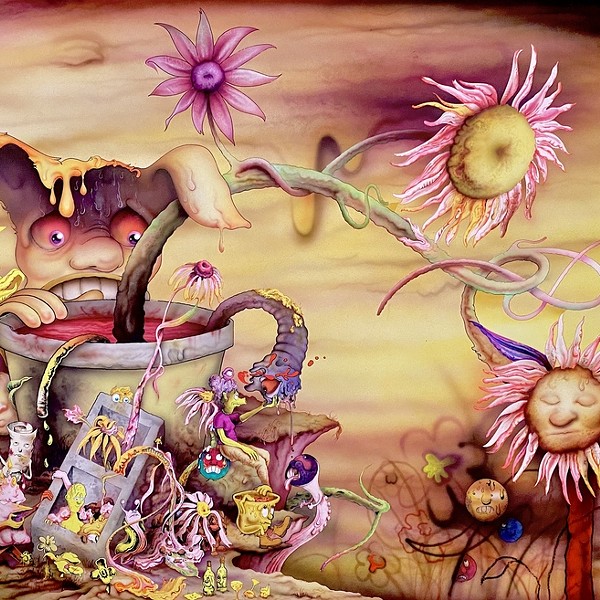It’s no accident that the railroad looms large in Love in Tennessee (Red Hen, 2009): The narrator’s father, like Bowers’ own, is a night telegrapher at a small-city depot in east Tennessee; his young son carries his dinner down the tracks in an old Christmas fruitcake tin. But Love in Tennessee, overflowing with idiosyncratic town characters whose lives and loves feel authentic as denim, is billed as a novel, not a memoir.
“Well, sure. I didn’t want to be sued or killed,” Bowers grins. He’s sprawled in his comfortably funky Phoenicia cabin, wearing a sweater that brings out the blue of his crinkly eyes. His folksy cadences and Smoky Mountains lilt seem tailor-made for the radio; he’d be a natural on “This American Life.” Bowers often closes his eyes as he speaks, as if the rich world of words inside his head requires his undivided attention.
He calls Love in Tennessee “a fictionalized memoir. It’s written about real people, but in some cases they’ve been changed quite a bit, or made into composites, including the love of my life—of the narrator’s life,” he amends with a quick glance at his second wife, architect Leslie Armstrong. “All those figures in the book have been in my head since I was 22 or 23. They never left my mind. It was an unbidden collection.”
Bowers turned 80 last year, so it’s been a long marination. That may be why the stories seem perfectly pitched, both nostalgic and fresh. There’s the overripe teacher who gives her male students flying lessons, the lustful fat man who looks like Clark Gable from the neck up, the cocky star athlete whose leg amputation changes his fortunes forever. Most of all, there’s the never-named narrator, who moves as a small boy among ladies’ rustling nylons, gets his sexual education in the backseats of buggies parked inside a barn, and finally meets his soulmate, the hometown girl he must leave behind to enter the wider world.
It’s not the first time Bowers has examined this theme. His breakthrough novel The Colony (E.P. Dutton, 1971) is a roman a clef about leaving his Tennessee sweetheart for a wildly eccentric Midwestern writers colony run by Lowney Handy and her protege, James Jones of From Here to Eternity fame. For a year and a half, Bowers joined other young men in a monastic apprenticeship, living in tents and motel rooms furnished only with cots, desks, and typewriters.
“Lowney Handy wouldn’t tolerate any female that came on the premises,” Bowers recalls. “She wanted to keep Jones on the reservation.” Her teaching method was unorthodox: Her “boys” were instructed to retype great novels. (“Let it seep into your brain and it’ll stay there.”) Though Bowers, who’s taught at Columbia and Wilkes University, doesn’t recommend the copying method, he’s grateful for his hands-on literary education. “I discovered Edith Wharton at the colony. I read Middlemarch, which is as topical as anything written today about a small town.” He also met Norman Mailer and Montgomery Clift, both of whom blast through The Colony.
Bowers’ Pygmalion was a rakish journalist named Chandler Brossard. After a colorful series of blue-collar jobs, Bowers moved to Washington, DC. He was languishing in a bureaucratic job at the State Department—“I was not a diplomat, by far”—when he asked out a co-worker Brossard was tailing for a Look magazine piece on “the typical Washington girl.” As Bowers remembers, Brossard got “immediately drunk” and advised him, “John, you’re wasting your time in DC. You’ll be among the living dead.” If he was serious about becoming a writer, New York was the place. Brossard even offered a place to stay, at his pied-a-terre on the Lower East Side.
Burning all bridges, Bowers moved to New York in 1962. Brossard had neglected to leave him a key; when Bowers finally got in, his apartment was trashed. But Brossard took him under his wing, introducing him around at Magazine Management—“the last of the pulps,” Bowers says—where a staff of ambitious young men, including Bruce Jay Friedman, Mario Puzo, and Joseph Heller ground out questionably factual but well-turned copy for lurid magazines like For Men Only and Male. “We’d write stories like ‘Rockaround Dolls of New Orleans,’ ‘Wild Women of Moscow,’ expose hotbeds of prostitution on Wall Street,” Bowers laughs, recalling the audacity of their inventions. “Puzo would write about World War II tank battles that never happened.”
But, Bowers says, “At the back of my mind, I still thought of myself as a serious artist. My idols were Hemingway, Fitzgerald, Thomas Wolfe—I was steeped in great literature. My idea of being a writer wasn’t to churn out ‘Hotsy-Totsy Girls of Tijuana.’”
He started freelancing for more legitimate magazines—Playboy, New York, the Saturday Evening Post—and developed a knack for catching careers on the updraft. The 1971 anthology The Golden Bowers includes profiles of a pre-Broadway Joe Willie Namath, just signed by the Giants but still enrolled at the University of Alabama; rising starlet Sharon Tate; Andy Warhol during the filming of Trash; Dionne Warwick appearing on Hullaballoo. This was the era of long-form magazine pieces and bottomless expense accounts, when an eager young man with a portable Olivetti could spend a year flying cross-country with a rising young singer named Janis, whose outrageous outfits and loud mouth could still get her tossed out of restaurants mid-interview.
Bowers loved Greenwich Village. “If you’re from the boondocks, it’s really an exotic land,” he exults. When New Yorker writer Lis Harris reviewed his 1973 novel No More Reunions, he invited her out. She demurred, but when he called again, one month later to the minute, she agreed to meet for coffee at the Lion’s Head, the “more civilized” of his Village hangouts (the other, the 55 Bar & Grill, was given to brawls). Both had the advantage of being right around the corner. “You could get as drunk as you liked and still make it home,” he recalls. “It was a giant dating scene, a rotating door.”
He married Harris and they had two sons. Bowers started writing nonfiction, including the In the Land of Nyx (Doubleday, 1984) a study of urban night workers whose title so thoroughly confused booksellers that he once found it filed under Gardening, and two books about the Civil War. His fact-based books show a novelist’s flair. “I couldn’t have Stonewall Jackson become a parachutist,” he says. “But even those who do biographies need to make up dialogue, to re-create scenes on the battlefield they couldn’t have experienced, so there is an element that’s fictionalized.”
Bowers gets up to poke the recalcitrant woodstove. Since marrying Armstrong last year, he’s become a less frequent Phoenician. “We have five houses and five kids between us,” he grins. “We rent `em out and try to juggle. This place is not San Simeon.”
Maybe not, but it fits him as comfortably as an old slipper. There’s an oversize office desk in the kitchen and bookshelves in every conceivable nook. The snug living room features a spiral staircase with tennis balls over exposed corners that might bump an unwary head (Bowers, a rangy 6’ 2”, has taken a few in the temple over the years).
He’s owned the cabin since 1969. After reading Alistair Cooke’s descriptions of an idyllic Woodstock, he took the bus up from the city. “In the back of my mind, I think I missed Tennessee—I wanted trees, a fire, all the things I grew up with. But I was really taken over by New York. New York was my fantasy, and it was coming true.” Bowers couldn’t afford Woodstock, but bought the first cabin he saw in Phoenicia, writing a check for $11,000 on the spot. He did not own a car. “I bought a house, then needed a car to go with it,” he says, ruefully recalling the rusty VW Bug whose floor sprayed his feet every time he drove over a puddle. “I remember just lying on the couch, thinking, ‘What the hell have I done?’” He moved into the cabin and wrote The Colony.
Bowers is currently writing a novel with thrillerish genes, Live Girls Dancing. The story seed was a grisly murder in Tennessee; he got intrigued with the case when it turned out several participants had been his classmates. He seems richly amused by the irony of struggling so hard to escape Tennessee and returning again and again in his writing.
Perhaps it goes back to his first published story. Bowers was 14 years old, and his mother, a literary enthusiast, had just bought him his first typewriter. “I took the advice ‘Write what you know’ to heart,” he explains. “I wanted a dog, so I made it into a story, with a conflict with the mother and father over the dog.” He mailed it off to a magazine he’d found in Writers Marketplace, went out to play basketball with a neighborhood boy, and forgot all about it. Six months later, a slender envelope came from Philadelphia. “‘Dear Mr. Bowers, we’re happy to accept your story for publication.’ They paid me five dollars. And the editor said, ‘We want to compliment you for getting into the mind of a 14-year-old boy.’” Bowers’ eyes crinkle up as he laughs. “That was something.”
John Bowers will read and sign at Barnes & Noble in Kingston on January 30 at 3pm. He will also appear at the Woodstock Writers Festival on February 14.

















